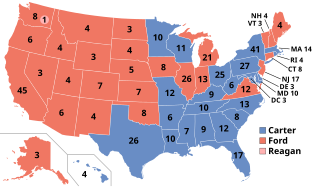
The 1976 United States presidential election was the 48th quadrennial presidential election, held on Tuesday, November 2, 1976. Democrat Jimmy Carter, former Governor of Georgia, defeated incumbent Republican president Gerald Ford in a narrow victory. This was the first presidential election since 1932 in which the incumbent was defeated, as well as the only Democratic victory of the six presidential elections between 1968 and 1988.
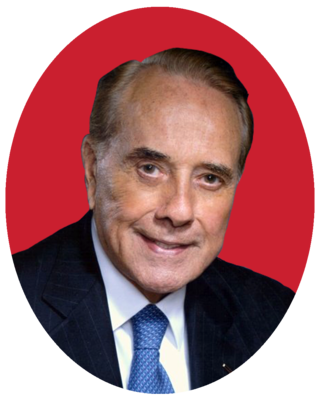
The 1996 Republican National Convention convened at the San Diego Convention Center (SDCC) in San Diego, California, from August 12 to August 15, 1996. The convention nominated former Senator Bob Dole from Kansas, for president and former Representative and secretary of Housing and Urban Development Jack Kemp, from suburban Buffalo, New York, for vice president.

William Howard Taft IV is an American diplomat and attorney who has served in the United States government under several Republican administrations. He is a son of William Howard Taft III and a great-grandson of President William Howard Taft.
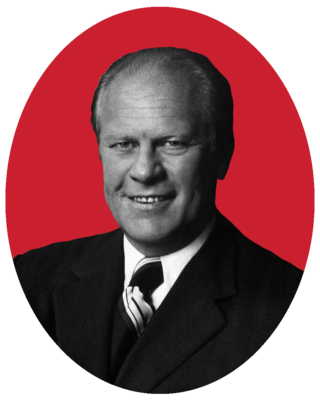
The 1976 Republican National Convention was a United States political convention of the Republican Party that met from August 16 to August 19, 1976, to select the party's nominees for president and vice president. Held in Kemper Arena in Kansas City, Missouri, the convention nominated President Gerald Ford for a full term, but only after narrowly defeating a strong challenge from former California Governor Ronald Reagan. The convention also nominated Senator Bob Dole from Kansas for vice president, instead of Vice President Nelson Rockefeller, who did not seek nomination for a full term. The keynote address was delivered by Tennessee Senator Howard Baker. Other notable speakers included Minnesota Representative Al Quie, retired Lieutenant Colonel and former Vietnam prisoner of war Raymond Schrump, former Democratic Texas Governor John Connally, Providence, Rhode Island mayor Vincent Cianci and Michigan Senator Robert P. Griffin. It is the last national convention by either of the two major parties to feature a seriously contested nomination between candidates.

Richard Schultz Schweiker was an American businessman and politician. A member of the Republican Party, he served as the 14th U.S. Secretary of Health and Human Services under President Ronald Reagan from 1981 to 1983. He previously served as a U.S. Representative (1961–1969) and a U.S. Senator (1969–1981) from Pennsylvania. In 1976, Schweiker was Reagan's running mate during his unsuccessful presidential campaign.
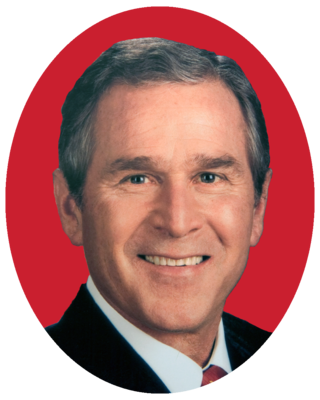
The 2000 Republican National Convention convened at the First Union Center in Philadelphia, Pennsylvania, from July 31 to August 3, 2000. The 2000 delegates assembled at the convention nominated Texas Governor George W. Bush for president and former U.S. Secretary of Defense Richard B. "Dick" Cheney for vice president.

Andrew Lindsay Lewis Jr., generally known as Drew Lewis, was an American businessman and politician from the state of Pennsylvania. He was United States Secretary of Transportation in the first portion of the administration of U.S. President Ronald W. Reagan, and is best known for presiding over the firing of the striking U.S. air traffic controllers in 1981.

The 1980 Republican National Convention convened at Joe Louis Arena in Detroit, Michigan, from July 14 to July 17, 1980. The Republican National Convention nominated retired Hollywood actor and former Governor Ronald Reagan of California for president and former Representative George H. W. Bush of Texas for vice president.

Gerald Rudolph Ford Jr. was an American politician who served as the 38th president of the United States from 1974 to 1977. He previously served as the leader of the Republican Party in the U.S. House of Representatives from 1965 to 1973, and as the 40th vice president under President Richard Nixon from 1973 to 1974. Ford succeeded to the presidency when Nixon resigned in 1974, but was defeated for election to a full term in 1976. Ford is the only person to become U.S. president without winning an election for president or vice president.

From January 19 to June 8 1976, voters of the Republican Party chose its nominee for president in the 1976 United States presidential election. The major candidates were incumbent President Gerald Ford and former Governor of California Ronald Reagan. After a series of primary elections and caucuses, neither secured a majority of the delegates before the convention.
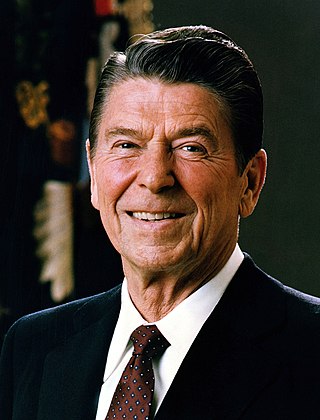
From January 21 to June 3, 1980, voters of the Republican Party chose its nominee for president in the 1980 United States presidential election. Retired Hollywood actor and two-term California governor Ronald Reagan was selected as the nominee through a series of primary elections and caucuses culminating in the Republican National Convention held from July 14 to July 17, 1980, in Detroit, Michigan.

The 1976 United States presidential election in Vermont took place on November 2, 1976, as part of the 1976 United States presidential election which was held throughout all 50 states and the District of Columbia. Voters chose three representatives, or electors to the Electoral College, who voted for president and vice president.

The 1976 United States presidential election in New York took place on November 2, 1976. All 50 states and The District of Columbia, were part of the 1976 United States presidential election. Voters chose 41 electors to the Electoral College, which voted for President and Vice President. New York was won by Democratic Georgia Governor Jimmy Carter, in a narrow victory against incumbent Republican President Gerald Ford, who failed to gain the presidency through formal election that year. Carter was running with Minnesota Senator Walter Mondale, and President Ford had selected Kansas Senator Bob Dole. The presidential election of 1976 was a very partisan election in New York, with more than 99% of the electorate voting for either Carter or Ford.

This article lists those who were potential candidates for the Republican nomination for Vice President of the United States in the 1980 election. Former California Governor Ronald Reagan won the 1980 Republican nomination for President of the United States, and chose former CIA Director George H. W. Bush as his running mate.

This article lists those who were potential candidates for the Republican nomination for Vice President of the United States in the 1976 election. At the 1976 Republican National Convention, incumbent President Gerald Ford narrowly won the presidential nomination over former California Governor Ronald Reagan. Ford had decided not to choose Vice President Nelson Rockefeller as his running mate, due to Rockefeller's unpopularity with the right wing of the Republican Party. He instead chose Senator Bob Dole of Kansas. Dole was acceptable to the conservative wing of the party, and Ford hoped that Dole would help the ticket win the western states and the agricultural vote. The Ford–Dole ticket lost the general election to the Carter–Mondale ticket. Though he would not win the presidential nomination, Reagan announced before the convention that he would pick Senator Richard Schweiker of Pennsylvania as his running mate. Dole went on to become Senate Republican leader, and the Republican presidential nominee in 1996, losing the general election to incumbent President Bill Clinton.

The 1976 United States presidential election in Illinois was held on November 2, 1976. All 50 states and The District of Columbia, were part of the 1976 United States presidential election. State voters chose 26 electors to the Electoral College, who voted for president and vice president.

The 1976 United States presidential election in South Carolina took place on November 2, 1976. All 50 states and the District of Columbia were part of the 1976 United States presidential election. South Carolina voters chose eight electors to the Electoral College, who voted for president and vice president.
Ronald Reagan announced his candidacy for President of the United States on November 20, 1975. He won primaries in several states, but eventually lost the nomination to incumbent president Gerald Ford at the 1976 Republican National Convention.
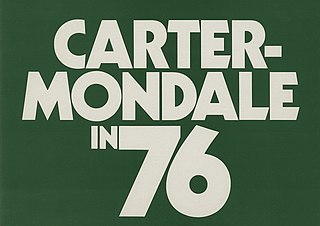
The 1976 presidential campaign of Jimmy Carter resulted in the election of Jimmy Carter and his running mate Walter Mondale as president and vice president of the United States, defeating incumbent Republican President Gerald Ford and his running mate Bob Dole. Carter, a Democrat and former governor of Georgia, launched his presidential bid in December 1974, as the Constitution of Georgia barred him from running for a second term as governor. In the wake of the Watergate scandal, the declining popularity of President Ford due to his pardon of Nixon, and the severe recession of 1974–75, many Democrats were sure of victory in the 1976 presidential election. As a result, 17 Democrats ran for their party's nomination in 1976. Carter's opponents mocked his candidacy by saying "Jimmy, who?", for his being relatively unknown outside Georgia. In response, Carter began saying "My name is Jimmy Carter, and I'm running for president." Carter extensively campaigned in the primaries, and in the end received 39.19% of his party's primary votes.


















